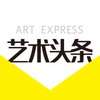分享到微信,
请点击右上角。
再选择[发送朋友]
或[分享到朋友圈]

As I began writing, the newspapers heralded 1000 days until the return of Hong Kong to China. The stark significance of this round number is more easily grasped and the descending numbers that follow it more real than the endless stories of airport negotiations or the continual meetings of the Joint Liaison Group. We now live self-consciously in the midst of history. It seems fitting as we tick off the days that Zhu Wei’s paintings are gobbled up by collectors faster than Sunday dim sum. Zhu Wei is the artist of the countdown. Embedded in our now shared history, Zhu Wei comments from across the border on the motherland preparing to embrace us: the family stands peering out the doorway (“the Sweet Life No.4), a child points, 1997 is on its way.
Discovered at Guangzhou’s China Art Expo in November, Zhu Wei was the undisputed star of last spring’s New Trend exhibition in Hong Kong. Certainly, the interest in Chinese Political Pop art generated by the success of the exhibition China’s New Art, Post-89, an the lure of the undiscovered and the unhyped are all contributing explanations, but other factors found in the arty itself may better explain Zhu Wei’s broad and meteoric rise in popularity. His work has struck a cultural chord in end-of-an-era Hong Kong, where unease and optimism, some willed, some truly felt, tug at the city’s heart.
Even those who do not read their surface text of Chinese characters and historical references realize these paintings are “radiant with consciousness” (nothing in his paintings seems accidental or purely decorative), that even if there were no market for his work, Zhu Wei would be impelled to paint them. He is a storyteller, a chronicler of Beijing. Paradoxically, we listen to him because he seems more interested in telling the story for himself than for us. We buy because he’s not selling.
The stories he paints are bittersweet tales to Hong Kong eyes. We laugh at the Punch and Judy buffoonery of the bloated cartoon characters while keeping our hands on our passports and out one-way tickets. Hong Kong compatriots-to-be want to believe that the larger than life People’s Liberation Army officers living “The Sweet Life”, are, despite their size, as insubstantial as they seem, like puppets of chicken wire and cloth. There is something almost Chaplinesque about them and their bald, goonish subordinates with big lips like a child’s valentine, looking as if the Little Tramp had stumbled into a closet of clothes fine size too big. We want them to be Chapin the Tramp not the Great Dictator.
Zhu Wei is part of a broad creative movement cutting across art, literature, and film that is expanding the realm of private expression and challenging the cultural hegemony of the Party with criticism and indifference. Like his Post-89 cohorts, Zhu Wei is irreverent and cheeky, but there is a sweetness, a gentleness to his brush missing from the more dominant cynicism of Political Pop with its pox-on-both-your-houses attitude towards Marxist and materialist alike. Zhu Wei is the Garrison Keillor of Chinese Painting, a gentle deflator of pretension, a chronicler of the everyday who sidles up to the humour in daily life rather than hitting it head-on. Even his most recent erotic works are more suggestive than explicit. He doesn’t go for the belly laugh but the knowing smile.
There is some of his paintings, a wide-eyed girl with braids who observes the adults scurrying around her (for example, “New Positions of the Brocade Battle No.1). Her very innocent presence reveals the Emperor’s nakedness, the posturing, the pretension of youths with their Walkman on the way to McDonald’s, the delivery service which is more promise than delivery, the officers sipping Cokes and living the good life.
Part and parcel of Zhu Wei’s gentle humour and his popular appeal is the inclusiveness of his art. There are no enemies, no us-them divide, no malevolent Other to blame, just a community of imperfect souls with their shared human foibles and follies. Zhu Wei is a satirist without venom, a moralist without brimstone. He is gently pushing outward the envelope of private expression and cultural criticism, casting his critical net far and wide to capture cadre and consumer alike. His work may not be the “poisonous weeks” Party hardliners denounce, but they are weeds cracking the cement of authoritarianism.
After ten years in PLA, he paints himself and his erstwhile comrades in their ill-fitting bagginess with the befuddlement they seem to deserve. They are not the architects of the new order but its pliable agents, swept along by currents and commands beyond their control and comprehension.
Soldier and civilian alike view the new world with impassive wariness. Look closely at the paintings: in almost none of them do figures look directly at each other or at us: they are always glancing up (”Descended from the Red Flag No.2”), sideways (“The Story of Beijing No.8”), or out of the corners of their eyes (“The Story of Beijing No.21”). If anyone looks straight ahead, it is the children with their wide-eyed innocence and wonder, na?ve to how the world works. The real action takes place outside the frame, beyond the stage of their lives and Zhu Wei’s actors know it. The script for their lives is written by unseen others.
We catch ourselves in mid-smile, as an aura of unease seeps through the humour. Zhu Wei’s wary characters seem to be listening for distant rumblings, trying to gauge the changing wind. However foolishly they may be portrayed, they are not fools: get rich quick, drink that Coke fast, open that foreign bank account and hope for the best. They, better than Western investors and analysts with their faith in progress’ straight line, seem to know that the winds of politics can suddenly shift. Every innocent act today can become evidence for the prosecution tomorrow.
Zhu Wei captures the intrusion of the new world of Chinese market socialism into old Beijing with a muted palette of browns and greens that gives his work the look of faded wall posters, of cave paintings from a distant time. The medium is in part the message: with a tinge of nostalgia he records this new world as plain fact neither to be celebrated nor overtly condemned. Zhu Wei greets the new China with a shrug, a soft smile and a sideways glance down the avenue.
998 and counting.
6 October, 1994
First published in Zhu Wei - The Story of Beijing, p.16-19, published by Plum Blossoms (International) Ltd., Hong Kong, 1994
Jeffrey Hantover was born and grew up in Kansas City, Missouri. He graduated from Harvard College, attended the John F. Kennedy School of Government and received a Masters in Sociology of Education and PhD in Sociology from the University of Chicago. He taught sociology at Vanderbilt University, was the director of a national social service agency in New York, and held senior positions in labor rights compliance for a major American clothing company. Jeffrey lived in Hong Kong for twelve years where he wrote on Asian art and culture.
作者:By,Jeffrey,Handover

分享到微信,
请点击右上角。
再选择[发送朋友]
或[分享到朋友圈]

